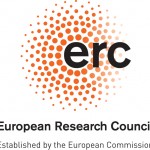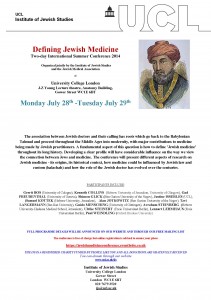8. July 2014 von Agnes Kloocke
Auf dem Ende Juli 2014 stattfindenden Kongress des Europäischen Judaistikverbandes (EAJS) ist die Jüdische Medizin mit einem eigenen Panel vertreten. Initiatoren sind die Mitarbeiter des Forschungsprojektes A03 (Talmudische Medizin im Vergleich mit den medizinischen Enzyklopädien der Spätantike) des SFB 980 (Episteme in Bewegung) unter Leitung von Phillip van der Eijk und Markham Geller.
In Paris werden bei dem im Vierjahresturnus stattfindenden Treffen Hunderte Vorträge von Wissenschaftlern aus der ganzen Welt erwartet. SFB-Projektmitarbeiter Lennart Lehmhaus, der mit Matteo Martelli auch Gastgeber ist und einen gemeinsamen Vortrag zu komparatistischen Aspekten des Projektes A03 präsentiert, hat erstmals ein ganztägiges Panel organisiert, in dessen Rahmen dreizehn Vorträge unterschiedliche Perspektiven auf das Thema Medizin in der jüdischen Tradition eröffnen werden.
Das Spektrum reicht hier von Traditionen aus der Zeit des zweiten Tempels über einen Schwerpunkt in der rabbinischen Literatur bis hin zu mittelalterlichen Texten und frühneuzeitlicher Mystik. Unter den Vortragenden, die aus der Europäischen Union, Israel und Nordamerika nach Paris kommen, ist die gesamte Bandbreite der aktuellen Forschergenerationen von Doktoranden und Post-Docs bis Professoren vertreten. Besonders hervorzuheben ist die Teilnahme des anerkannten Medizinhistorikers Prof. Samuel Kottek von der Hebräischen Universität in Jerusalem (Hadassa Medical School) sowie der beiden Expertinnen Prof. Tirzah Meacham (Toronto) und Prof. Carmen Caballero-Navas (Malaga).
Einen Überblick zum Programm des Panels ‘Jüdische Medizin’ finden Sie unten, das Gesamtprogramm der Konferenz siehe EAJS Conference Programme.
Das Panel ‚Jüdische Medizin‘ wird ermöglicht und unterstützt durch den Sonderforschungsbereich 980 “Episteme in Bewegung”.
L. Lehmhaus
Panel Programme
Jewish Medicine
European Association of Jewish Studies, Xth Congress, Paris;
ESN, Rue d’Ulm
July 24, 2014, 9 am – 6 pm
Session 1
Federico Dal Bo (Berlin), A Fetus Shaped like a “Sandal”.
Reuven Kiperwasser (Stockholm/ Jerusalem), The Cure of Amnesia and the Metaphoric Physiology of Memory.
Kenneth Collins (Jerusalem/ Glasgow), The Fever that Nourishes: the Purpose of Fever in Rabbinic Texts.
Session 2
Samuel Kottek (Jerusalem), Caesarean Section in the Talmud and in Greco-Roman culture: A renewed examination.
Estee Dvorjetski (Haifa), Public Health in Jerusalem according to the Talmudic Literature: Reality or Vision?
Aviad Recht (Tel Aviv), ‘The Regimens of Health of the Sages’ – Hellenistic Medical Genre as Processed by the Sages.
Session 3
Ronit Yoeli-Tlalim (London), Asian Lore in the Hebrew Book of Asaf.
Tamas Visi (Olomouc/ Jerusalem), Uroscopy in Sefer Assaf.
Carmen Caballero-Navas (Malaga), Women’s Secrets: An Assessment of the Early Stage of the Foundation of Hebrew Gynaecology.
Session 4
Shulamit Shinnar (New York), The Experiments of Cleopatra: Rabbinic Attitudes towards Other Ancient Medical Traditions.
Tirzah Meacham (Toronto), Physicians, Expertise and Halakha: Are Purity Issues Different?
Assaf Tamari (Beer Sheva), “For I the Lord am your healer”? The Medical Discourse of Lurianic Kabbalah and its Contexts.
Matteo Martelli/Lennart Lehmhaus (Berlin), Transfer of medical knowledge in Late Antique encyclopaedic traditions – a preliminary survey.
The panel on ‚Jewish Medicine‘ is organised and convened by Matteo Martelli (Humboldt-Universität zu Berlin) and Lennart Lehmhaus (Freie Universität Berlin), members of the project A03 within the Collaborative Research Center SFB 980 – Episteme in Motion, headed by Prof. Philip van der Eijk (HUB) and Prof. Markham J. Geller (FUB).




 Die
Die